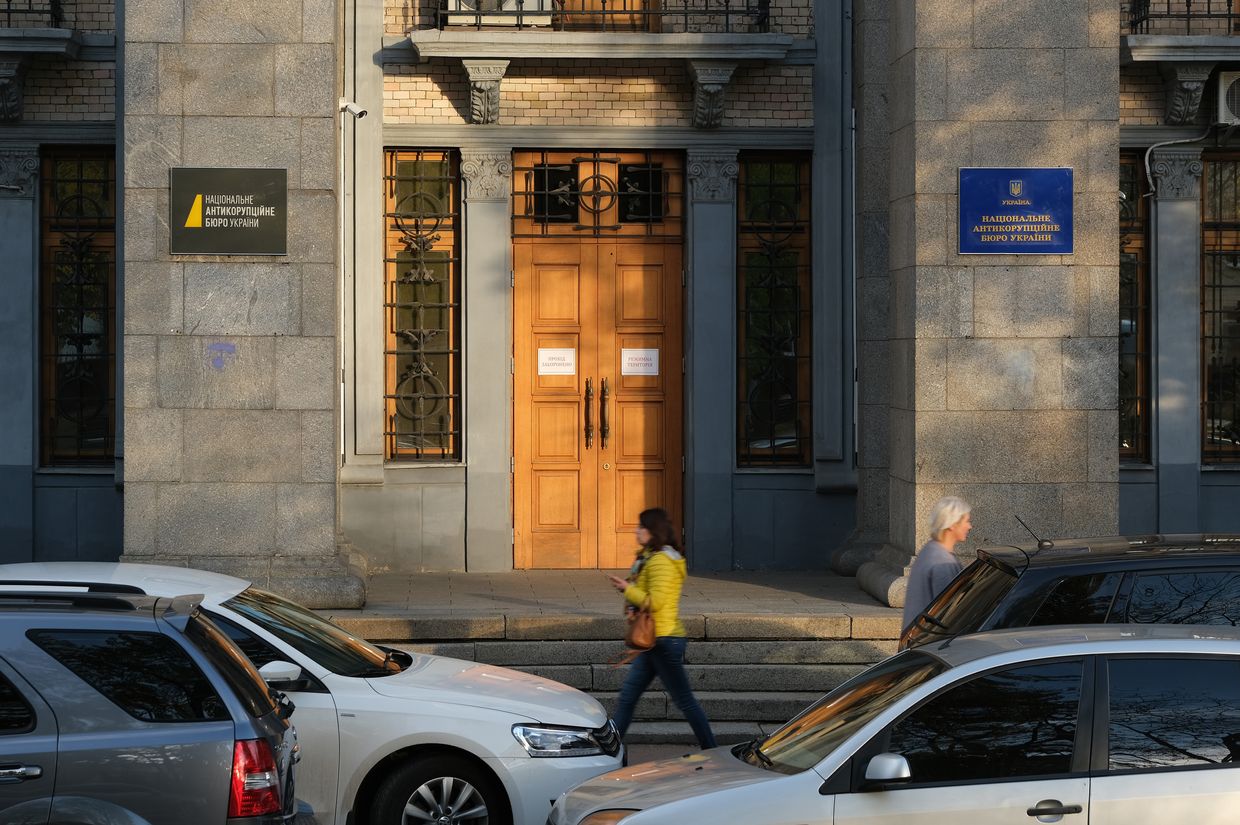As Zelensky’s party falters, Ukrainian parliament drifts to standstill

Ukraine's President Volodymyr Zelensky poses for a photo before a meeting with British Prime Minister Rishi Sunak during the European Political Community summit at the Palacio de Congreso on Oct. 5, 2023 in Granada, Spain. (Juan Medina - Pool/Getty Images)
In recent months, Ukraine’s parliament is drifting to a standstill, as the government struggles to gather necessary votes during sessions.
The reason is not political disagreement over pending legislation, but a general sense of frustration among parliament’s members, according to experts and lawmakers who spoke to the Kyiv Independent. Some of them asked not to be named to avoid political retribution.
Lawmakers cited different reasons for their dissatisfaction, including increased restrictions on their travel abroad, poor communication or pressure from other government bodies, growing concentration of power in the President’s Office, and being blamed for unpopular policies by their constituencies or other government officials.
The two most commonly cited reasons are the travel restrictions, and a general breakdown in the relationship between parliament and other branches of the government.
Some lawmakers feel Ukraine’s government is shifting responsibility onto parliament for unpopular legislation, said Dmytro Natalukha, a member of the Servant of the People majority party and chairman of the parliamentary Economic Committee.
“There appears a growing feeling that parliament is now the ultimate scapegoat of all the bad things that are happening in the country, which a lot of my colleagues consider unfair,” said Natalukha, adding that lawmakers “don’t want to be the one who will press the button and then take all the blame.”
Currently, bills vital to the war effort – such as the extension of martial law every three months and reforms necessary for EU integration – still pass with broad support. However, domestic issues such as tax reform are becoming increasingly stalled by a lack of votes.
With critical legislation on the agenda for 2024, including an upcoming bill to mobilize more soldiers, leaders in parliament have acknowledged the worsening situation.
Davyd Arakhamia, the head of President Volodymyr Zelensky's Servant of the People majority faction in the Verkhovna Rada, warned in January of a “looming crisis” in parliament during a discussion with media groups, citing a lack of unity and a drop in the number of parliamentary seats filled.
Arakhamia did not respond to questions for this article, sent to him via LinkedIn and WhatsApp.

Falling number of parliamentarians
The Verkhovna Rada, Ukraine's parliament, has a record low 401 members. By law there should be 450.
Half of Ukraine’s lawmakers are elected by distributing seats proportionally among parties to fill from party lists. When such members resign or leave their posts, they can be replaced by their party without the need for another election.
The other half, however, are elected individually and can only be replaced through new elections, which are suspended under martial law. When lawmakers in these seats leave their posts, the seats remain vacant.
After the most recent elections in 2019, only 424 seats were filled, due to the impossibility of holding elections in Crimea, illegally annexed by Russia, and occupied territories in eastern Ukraine. Since 2022, that number has continued to drop.
Immediately after the full-scale invasion, 11 pro-Russia political parties were banned, and four lawmakers were stripped of their parliamentary mandate. Other members have since resigned, left parliament due to scandals or criminal cases, been promoted to cabinet positions, and a few have died.
Many more have requested to resign from their positions, but parliament has decided to block further resignations unless due to medical necessity, Arakhamia said in December.
If not for the war and martial law, fresh elections would have been held in October 2023. Instead, lawmakers are in their positions indefinitely.
Despite the drop in number of the total lawmakers, experts note that Zelensky’s ruling party still holds a supermajority of 235 seats, while only 226 are needed to pass most legislation.
“The formal number of parliament members is not as important as how much they are actually present in the session hall,” said Oleksandr Salizhenko, a parliamentary analyst for the non-profit political watchdog Chesno.
Though lawmakers can be blocked from resigning, they can’t be forced to vote. If parliamentary members from the Servant of the People faction attended and voted during sessions along party lines, the party would have the numbers to pass desired legislation. But at the most recent March 28 parliamentary session, only 154 members of the faction were registered as present for voting.

“Therefore, I would rather describe it as a crisis in the Servant of the People party, not a crisis of parliament,” Salizhenko said.
While most agree that there is not a full-blown parliamentary crisis yet, it is clear that members of parliament are dissatisfied.
Ihor Chalenko, a political scientist who heads the Ukrainian think tank Center for Analysis and Strategies, describes the slowdown in legislative activity as a form of protest.
“The morale of the lawmakers is really depressed today,” said Chalenko. “We see that there are real problems with the sufficiency of votes for certain bills.”
‘It is better to not show up’
According to the parliament members and political experts, there is no single reason for the breakdown.
One of the most contentious issues has been limitations on lawmakers traveling abroad.
Already, all Ukrainian men 18-60 years old are banned from leaving Ukraine during martial law, with special exceptions.
An additional ban by the National Security and Defense Council in January 2023 further restricted all top officials – including lawmakers regardless of gender – from traveling abroad unless receiving special permission for state business, after a deputy prosecutor general abused travel privileges to go on vacation. The scandal sparked outrage among Ukrainians.
However, members of parliament have reported cases where they were refused permission even for official business abroad.
Parliamentary diplomacy has been effective in swaying allies to provide support, and limiting travel is “damaging for our country’s war effort,” said Natalukha, the Economic Committee chair. “Why would one want to limit the possibility to communicate with allies?”
Some lawmakers the Kyiv Independent spoke with have called the limits “too careful,” but others directly attribute decisions about travel to political punishment connected with how they vote.
Yaroslav Zhelezniak, a member of the liberal Holos party and first deputy head of the Committee on Finance, Tax, and Customs Policy, said he was forbidden from visiting Brussels despite an invitation from a European Parliament member after he voted against a draft law championed by the President’s Office. He said he was also warned he would not be given permission to travel to Paris for a meeting of the OECD Global Parliamentary Network.
After other members who voted in favor of the law were allowed to travel, he understood the decisions as an attempt by the President’s Office to exert undue influence on his legislative activity.

When parliament members feel their ability to travel for work depends on their voting, “they are just like hostages,” Zhelezniak told the Kyiv Independent. This contributes to demoralization and absenteeism: “It’s better to not show up, than to vote negatively and be punished.”
Several lawmakers from opposition parties and the Servant of the People party echoed Zhelezniak’s sentiment to the Kyiv Independent, many on the condition of anonymity due to fear of retaliation, saying that they feel increasingly powerless in the face of the influential President’s Office.
Outside the parliament, experts have a similar observation.
“There is a feeling that the parliament is effectively on pause and there is a perceived conflict between the president and the parliament,” said Ukrainian political scientist and commentator Mykola Davydiuk.
Iryna Pobedonostseva, a representative for the President’s Office, said in a statement that charges of the office’s interference in lawmakers’ foreign travel “do not correspond to reality,” and noted that parliament’s leadership is responsible for travel approval.
“The position of the Office of the President is very clear – during a full-scale war, all representatives of all branches of government, including legislative, executive and judicial, as well as absolutely all officials in the field of public administration must work at 100%,” the statement said.
Some in Zelensky’s party feel the blame lies outside of the government, however. Mykyta Poturaiev, chair of the Humanitarian and Information Policy Committee, believes negative public opinion against parliament is a bigger driver of a lack of participation for some of his colleagues.
“I understand that in every country people don't like parliaments,” said Poturaiev. But after voting on historically vital laws for national security, defense, and European integration, “you don’t feel support from the media, you don’t feel support from the population.”
“How should they feel when they read about themselves, that they are all bastards, corrupt bastards?”
In December, a poll by the Kyiv International Institute of Sociology found that only 15% of Ukrainians trusted parliament, down from 35% the prior year and the lowest among government bodies in the poll.
Additionally, what it means to be a parliamentarian has changed since the elections in 2019. Parliamentary immunity, which required approval by parliament before arresting or charging lawmakers, was abolished later that year. And efforts to bring Ukraine up to European standards have led to increased financial monitoring and reporting requirements on lawmakers and their families.
“If earlier politicians were sure that they had certain protection against law enforcement and anti-corruption bodies, now there is no such thing,” said Salizhenko, of Chesno.
This heightened scrutiny has contributed to the fall in parliament’s reputation, as several MPs have been implicated in corruption cases since the last election, including being caught attempting to solicit or take bribes. However, parliament is not the only government body to be hit by recent corruption scandals, with high-profile cases also hitting the Defense Ministry, President’s Office, and the Cabinet.
Salizhenko also notes that journalists have not been allowed in parliament during the war, due to security reasons. “The presence of journalists, as it was before the full-scale invasion, kept all the MPs on their toes, and this at least stimulated them to attend meetings and work.”
‘There is no magic pill to solve this problem’
Though many agree that travel restrictions are currently a key sticking point, “there is no magic pill to solve this problem,” said Zhelezniak of the Holos party. “There are a lot of small things, which can be combined.”
To reach enough votes, Zelensky’s party faces a choice: increase cooperation across party lines or resolve dissatisfaction within their majority.

Natalukha believes the core issue is a “crisis in communication” across the government that requires more joint cooperation between parliament and other government bodies.
The Office of the President and cabinet officials have held meetings with parliamentary members in recent months to improve relations, but these have yet to bear fruit. Some members of parliament left the meetings feeling they were still not being heard, according to attendees and sources who spoke to them after the meetings.
Two years after the full-scale invasion, “politics has returned to parliament,” said Chalenko, of the Center for Analysis and Strategies. The ruling party can no longer count on legislation sailing through easily, as it had in the immediate aftermath of the February 2022 invasion.
But parliament’s ability to function as a “island of stability” is vital to the country’s future, said Chalenko.
"There is really a lot that now depends on the productivity of the Ukrainian parliament itself,” he told the Kyiv Independent. “Let me remind you that our state is still a parliamentary-presidential one, despite the enormous influence of the current president, Zelensky. Therefore, the work of parliament must continue.”










